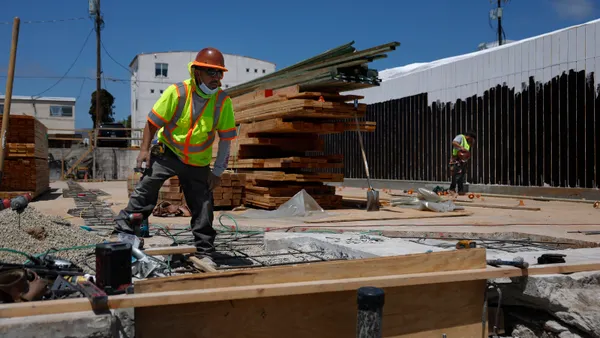Dive Brief:
- The Department of Energy’s Lawrence Berkeley National Laboratory (LBNL) is backing two projects to help California meet its zero net energy (ZNE) building goals, including a detailed analysis of costs and indoor air quality concerns.
- California wants all new homes constructed to be energy-neutral on an annualized basis by 2020. That will involve constructing highly-efficient homes with some kind of on-site generation or access to community green options.
- The California Energy Commission is providing $2 million in funding for LBNL's research, while the DOE’s Building America program is also supporting the air quality project.
Dive Insight:
There is a growing focus on residential energy efficiency, particularly in new home construction. Two years ago, Demand Institute found efficiency was the top housing concern. And last year, Austin, Texas, began requiring all new home construction to include smart thermostats capable of connecting with the city's utility and demand management programs.
California's proposal for all new homes to be energy neutral is a step further, and could represent a significant challenge in some areas. For instance, LBNL will need to study the cost implications of the goals for neighborhoods or communities that do not have natural gas infrastructure, as well as the implications of an all-electric home or one with gas heating.
“If we want to achieve deep carbon reductions then ultimately we want to sharply reduce or eliminate natural gas consumption,” Max Wei, a LBNL researcher, said in a statement. “Another key modeling area is energy storage and demand response and how these could be implemented to lower overall costs.”
Wei's research will look at various climate zones with the goal of informing future ZNE policies. “For example, if we find that all-electric homes are more cost-effective in some regions of the state, then that would be an interesting finding,” he said.
Last year, Southern California Gas teamed up with KB Home and BUILDER magazine to create a demonstration home integrating the most efficient gas and electric technologies. The utility wants to showcase advances that can help make ZNE homes a reality, but said recent surveys showed homeowners prefer to have access to gas.
According to SoCal Gas, residential surveys showed that more than 80% of customers preferred dual-fuel homes, if given a choice.
California will, "for the foreseeable future," continue to build homes with gas appliances, LBNL said. As homes become more efficient and more tightly built, air quality will become an even greater issue. LBNL's second project will look at how to provide ventilation to maintain indoor air quality in these homes.
“The kitchen generates a lot of pollutants, especially in homes with gas burners,” said LBNL researcher Brett Singer. “We want to efficiently remove those pollutants where they’re generated so we don’t waste energy over-ventilating the whole house.”












